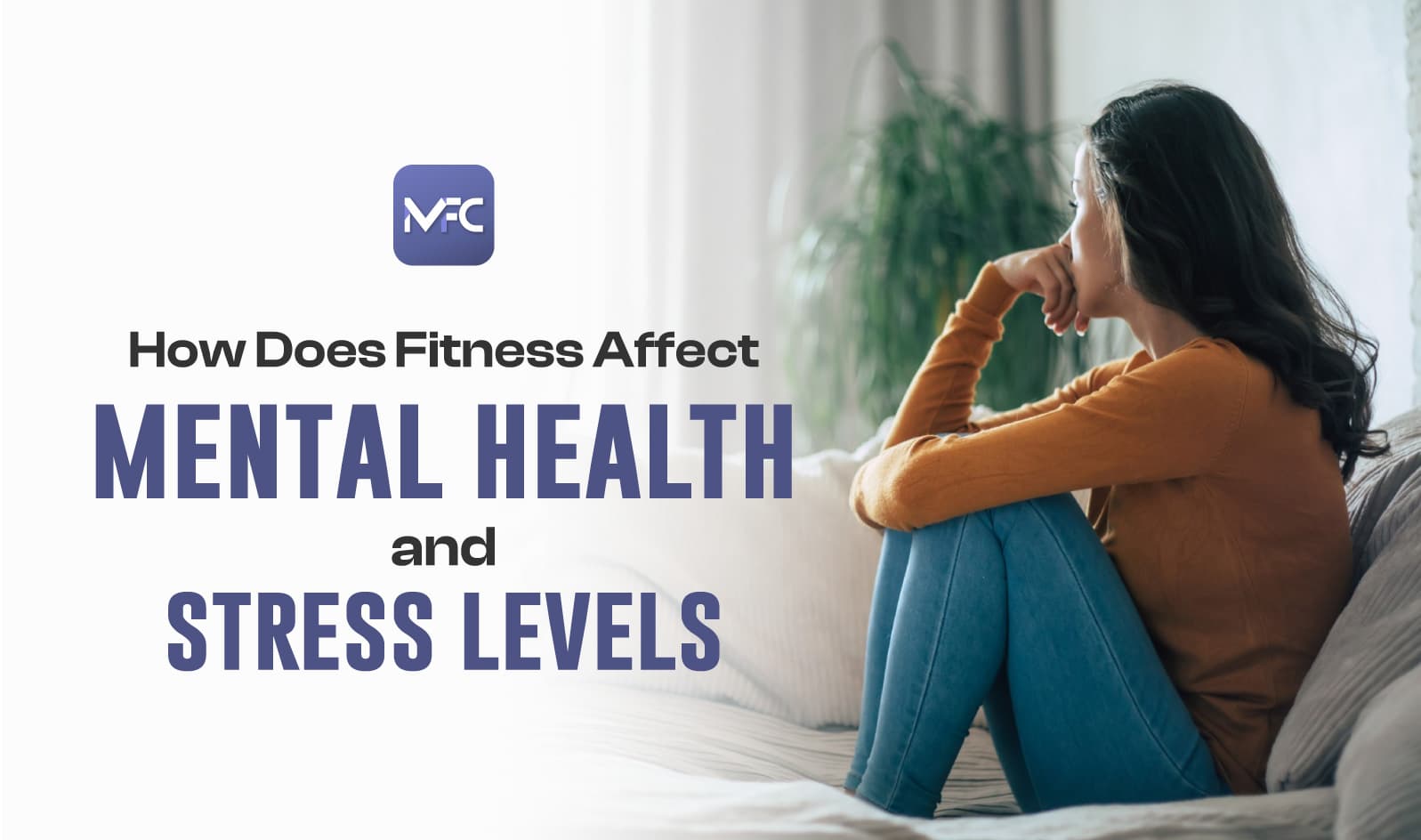How Does Fitness Affect Mental Health and Stress Levels?

MyFitnessCoach
December 11, 2024
In today’s fast-paced world, maintaining good mental health is becoming more challenging for many people. From daily pressures at work to personal responsibilities and financial stress, our lives are filled with demands that can take a toll on our mental well-being. While some turn to meditation, therapy, or mindfulness practices, fitness and physical activity are increasingly recognized for their positive impact on mental health and stress management. Fitness doesn’t just build physical strength and endurance; it also helps us develop resilience, lift our moods, and combat stress on a mental level. Let’s dive into the science behind this connection, explore how regular exercise impacts mental health, and discuss simple ways you can incorporate fitness into your life to experience these benefits.
Fitness as a Tool for Reducing Stress
Stress is an inevitable part of life, and while some stress can be motivating, chronic stress is harmful. When you experience stress, your body releases stress hormones, including cortisol. Cortisol in small amounts can help the body manage short-term stress, but when elevated over a long period, it can lead to fatigue, anxiety, and even depression.
Exercise is one of the most effective ways to reduce stress and manage cortisol levels. Physical activity helps flush out excess cortisol and reduces the body’s response to stress. Engaging in physical fitness, particularly cardio or high-intensity workouts, can allow you to release built-up tension in the body. Additionally, exercise can shift your mind away from stressors, giving you a mental break that often leads to a fresh perspective.
How Different Types of Exercise Affect Mental Health
Different types of exercise affect mental health in unique ways. Understanding these can help you select the kind of exercise best suited to your needs and goals.
1. Cardiovascular Exercise
Cardio workouts, such as running, cycling, and swimming, are excellent for reducing stress and improving mood. Cardio increases the production of endorphins, which elevate mood and provide a natural sense of euphoria. It can be particularly effective for relieving stress after a long, demanding day.
2. Strength Training
Strength training can improve self-esteem and help combat depression and anxiety. Lifting weights or doing bodyweight exercises not only boosts physical strength but also empowers you mentally. Completing challenging sets and lifting heavier weights over time can create a sense of accomplishment and self-worth. It can be especially beneficial for people who struggle with self-esteem and self-confidence.
3. High-Intensity Interval Training (HIIT)
HIIT workouts combine short bursts of intense exercise with periods of rest or lower-intensity activity. Because of the demanding nature of HIIT, these workouts can produce a significant endorphin release, reducing stress levels and improving mood. HIIT is also efficient; even a 15-minute session can provide mental health benefits.
4. Yoga and Mindfulness-Based Exercise
Yoga and other mindfulness-based exercises like tai chi help calm the mind and body. The combination of controlled breathing, meditation, and gentle movement can lower anxiety levels and improve focus. Yoga, in particular, helps people become more aware of their bodies, which can lead to a better mind-body connection and aid in stress relief.
Fitness Improves Sleep Quality, Which Benefits Mental Health
Quality sleep is crucial for mental well-being, and exercise can significantly improve sleep patterns. Regular physical activity helps regulate sleep hormones, such as melatonin, which controls the sleep-wake cycle. When you exercise regularly, your body gets tired, which makes it easier to fall asleep and stay asleep. Proper sleep helps reset your mind, provides energy for the day, and reduces irritability and stress.
Poor sleep, on the other hand, has a detrimental effect on mental health. Lack of rest can increase anxiety, worsen mood, and even contribute to depression. By establishing a consistent exercise routine, you are setting the foundation for better sleep and, in turn, better mental health.
How to Start Using Fitness to Improve Mental Health and Lower Stress
Starting a fitness routine for mental health doesn’t have to be overwhelming. Here are a few steps to help you begin a fitness journey with the primary goal of improving mental well-being.
- Set Simple Goals: Begin with small, achievable fitness goals. Instead of aiming to run a marathon, start with a 15-minute walk or a short HIIT session. Over time, as you meet these goals, you’ll feel more motivated and confident.
- Choose Activities You Enjoy: Find an exercise you genuinely enjoy, whether it’s swimming, dancing, or hiking. When you enjoy an activity, it feels less like a chore and more like a break from the day’s stress.
- Start with Consistency, Not Intensity: It’s not necessary to dive into intense workouts right away. Start with light exercises a few times a week and gradually increase your intensity. Consistency is more effective than intensity in building a long-term fitness habit that benefits mental health.
- Incorporate Mindful Breathing: Include mindful breathing exercises during and after your workouts. This can improve relaxation, reduce anxiety, and give you a deeper sense of calm.
- Seek Support When Needed: If you’re new to fitness or need guidance, consider seeking support from a fitness app like MyFitnessCoach, which offers structured workouts and fitness guidance. Having guidance and motivation makes it easier to stay consistent and achieve your mental health goals.
Using MyFitnessCoach to Support Mental Health and Reduce Stress
If you’re looking for a convenient way to incorporate fitness into your daily life, MyFitnessCoach can be a valuable tool. MyFitnessCoach provides accessible, expert-designed workouts suitable for all fitness levels, so whether you're a beginner or advanced athlete, you’ll find routines that cater to your specific needs. With options like HIIT, strength training, cardio, and yoga, MyFitnessCoach offers variety, allowing you to experiment with different types of workouts to see which benefits your mental health the most.

The structured programs and engaging trainers in the MyFitnessCoach app help keep you motivated and focused on your fitness journey. When exercise becomes a regular part of your life, you’ll experience greater mood stability, reduced stress, and an overall boost in mental resilience. So, if you’re ready to take the next step toward better mental health, download MyFitnessCoach today and begin exploring how fitness can transform not only your body but also your mind.
Similar Articles
Stay informed with these similar articles.

MyFitnessCoach
October 18, 2023
What Does Body Goals Mean? A Path to a Healthy Lifestyle
In the world we live in now, lots of people talk about "body goals," which means having a body that's seen as perfect. On social media, in magazines, and on TV, we see lots of pictures of people with what seems like perfect bodies, which makes us feel like we have to look like them. But the real meaning of "body goals" is more than just looking good. It's about taking care of your whole self, not just how you look. In this article, we will discuss what does body goals actually mean and how you can achieve your body goals. Let’s get started:
.webp&w=3840&q=75)
MyFitnessCoach
September 5, 2023
How Much Protein in an Egg | The Nutritional Power
Eggs have long been a breakfast favorite for many, and for good reason. They're not only delicious but also packed with essential nutrients, making them a versatile and nutritious addition to your diet. One of the most common questions about eggs is, "How much protein is in an egg?" In this comprehensive guide, we'll delve into the world of eggs and explore their protein content, nutritional benefits, and how they can contribute to a balanced diet.

MyFitnessCoach
May 18, 2023
Fitness Guide: How Do I Start A Weight Loss Journey
Ready to start on a life-changing weight-loss journey? Congratulations for taking the first step towards being a better and happier version of yourself! Starting off a weight-loss journey may be both satisfying and stressful. With so much information available, having a well-defined plan and trusted assistance in achieving your goals is important. This article will help you start your weight-loss journey and achieve the results you desire.
